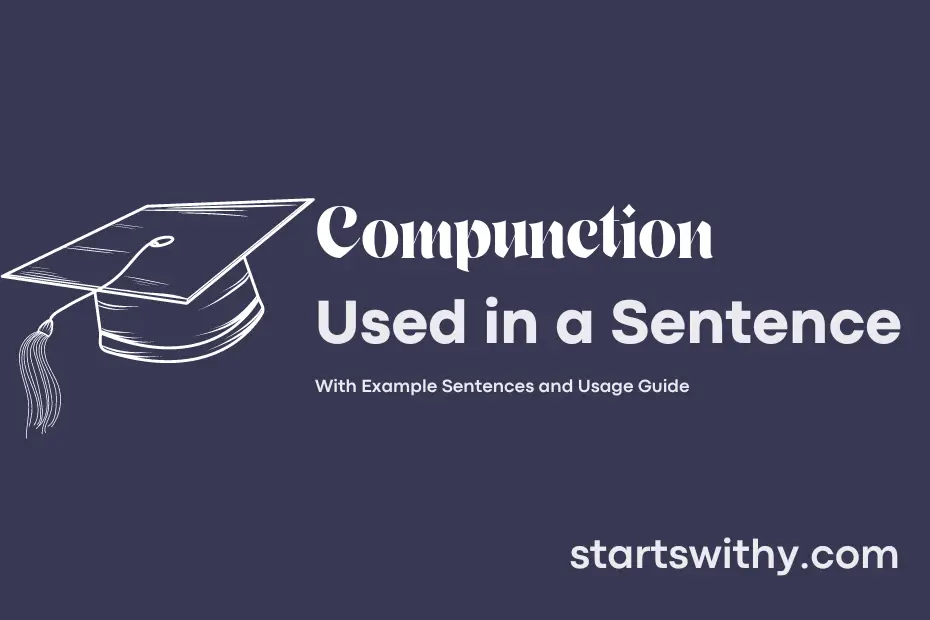Have you ever felt a sense of reluctance or hesitation when faced with a decision or action that goes against your moral compass? This inner feeling of guilt or unease is known as “compunction.”
Compunction often arises when one is conflicted between what they believe is right and what is expected of them, causing a sense of moral dilemma. It can lead to a deep sense of remorse or regret if a decision is made that goes against one’s values or principles.
7 Examples Of Compunction Used In a Sentence For Kids
- Compunction means feeling sorry for doing something wrong.
- It’s important to have compunction when we hurt others’ feelings.
- We should always show compunction when we make a mistake.
- It’s okay to feel compunction when we do something that we know is not right.
- Remember to have compunction and say sorry when you make a mistake.
- Let’s practice showing compunction by apologizing when we do something wrong.
- Having compunction helps us learn from our mistakes and become better people.
14 Sentences with Compunction Examples
- Compunction filled her heart as she submitted her assignment at the last minute.
- He felt a sense of compunction as he copied his friend’s notes instead of studying on his own.
- Despite his compunction, he skipped class to catch up on sleep.
- Compunction set in when she realized she had forgotten about the upcoming exam.
- With a hint of compunction, he asked his professor for an extension on the project deadline.
- She couldn’t help but feel a pang of compunction for not attending the guest lecture by a renowned scholar.
- His compunction was evident as he confessed to his peers about missing an important seminar.
- The group project suffered due to her compunction of not speaking up and sharing her ideas.
- Despite feeling a twinge of compunction, she decided to take a break from her studies and relax with friends.
- His sense of compunction grew as he realized he had wasted valuable time scrolling through social media instead of studying.
- She experienced a moment of compunction when she chose to prioritize a social event over attending a career workshop.
- The constant compunction of not attending tutorials began to weigh heavily on his conscience.
- Her compunction deepened when she realized she had unintentionally copied someone else’s work in her assignment.
- He grappled with compunction as he debated whether to drop a challenging course or push through it.
How To Use Compunction in Sentences?
Compunction is used in a sentence when you want to express a feeling of guilt or remorse.
For example:
- “She felt compunction for lying to her friend about the surprise party.”
- “He showed no compunction about taking credit for her work.”
- “I was filled with compunction after realizing I had forgotten my best friend’s birthday.”
When using compunction in a sentence, remember to place it before a preposition like “for” to show the reason for feeling guilty or remorseful.
It’s important to note that compunction is a noun, so it should be used in the correct context within the sentence.
Try to incorporate compunction when describing feelings of regret, guilt, or unease over a past action or decision. Be sure to place compunction appropriately within the sentence to convey your intended meaning clearly and effectively.
Practice using compunction in various sentences to become more familiar with its usage and to better express different emotions or situations requiring a sense of guilt or remorse. Remember, the more you practice, the more comfortable you will become with incorporating compunction into your writing and communication.
Conclusion
In conclusion, sentences with compunction convey a sense of remorse, guilt, or hesitation in their expression. These sentences often reflect a moral dilemma or a conflict of conscience within the speaker, showcasing their inner struggle and reluctance to proceed with a certain action. Such sentences can evoke empathy from the reader by highlighting the complexities of human emotions and ethical decision-making.
By using sentences with compunction, writers can add depth and complexity to their narratives, allowing readers to delve into the inner turmoil and moral quandaries faced by characters. This linguistic device effectively captures the nuances of human behavior and moral struggles, making the storytelling more captivating and relatable to the audience.



